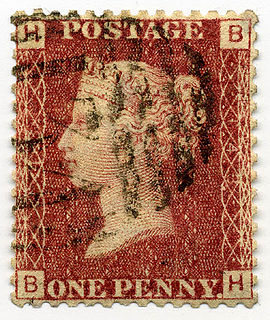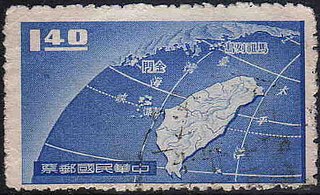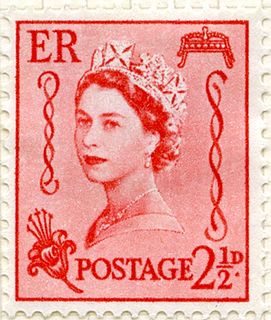
Philately is the study of postage stamps and postal history. It also refers to the collection, appreciation and research activities on stamps and other philatelic products. Philately involves more than just stamp collecting or the study of postage; it is possible to be a philatelist without owning any stamps. For instance, the stamps being studied may be very rare or reside only in museums.

A cancellation is a postal marking applied on a postage stamp or postal stationery to deface the stamp and to prevent its reuse. Cancellations come in a huge variety of designs, shapes, sizes, and colors. Modern cancellations commonly include the date and post office location where the stamps were mailed, in addition to lines or bars designed to cover the stamp itself. The term "postmark" refers specifically to the part that contains the date and posting location, but the term is often used interchangeably with "cancellation" as it may serve that purpose. The portion of a cancellation that is designed to deface the stamp and does not contain writing is also called the "obliteration" or killer. Some stamps are issued pre-cancelled with a printed or stamped cancellation and do not need to have a cancellation added. Cancellations can affect the value of stamps to collectors, positively or negatively. Cancellations of some countries have been extensively studied by philatelists, and many stamp collectors and postal history collectors collect cancellations in addition to the stamps themselves.

An overprint is an additional layer of text or graphics added to the face of a postage or revenue stamp, postal stationery, banknote or ticket after it has been printed. Post offices most often use overprints for internal administrative purposes such as accounting but they are also employed in public mail. Well-recognized varieties include commemorative overprints which are produced for their public appeal and command significant interest in the field of philately.

Postage stamps and postal history of Great Britain surveys postal history from the United Kingdom and the postage stamps issued by that country and its various historical territories until the present day.

The Kionga Triangle was a tiny territory on the border between German East Africa and the Portuguese colony of Mozambique, originally German, but occupied by Portuguese forces in 1916. The triangle was the only German territory that the post-war Treaty of Versailles awarded to Portugal.

The Vatican post office has operated its own postal service and issued its own postage stamps since 1929.

L.N. and M. Williams were a philatelic writing partnership made up of brothers Leon Norman Williams and Maurice Williams (1905–1976).

John Harry Robson Lowe was an English professional philatelist, stamp dealer and stamp auctioneer.

The postage stamps and postal history of Israel is a survey of the postage stamps issued by the state of Israel, and its postal history, since independence was proclaimed on May 14, 1948. The first postage stamps were issued two days later on May 16, 1948. Pre-1948 postal history is discussed in postage stamps and postal history of Palestine.
The postage stamps and postal history of Palestine emerges from its geographic location as a crossroads amidst the empires of the ancient Near East, the Levant and the Middle East. Postal services in the region were first established in the Bronze Age, during the rule of Sargon of Akkad, and successive empires have established and operated a number of different postal systems over the millennia.

Frederick John Melville was a British philatelist, prolific philatelic author and founder of The Junior Philatelic Society. He was also a founder in 1907 of the Philatelic Literature Society. Melville is a member of the American Philatelic Society's Hall of Fame and was a signatory to The Roll of Distinguished Philatelists in 1921.
The China Stamp Society is a philatelic organization dedicated to the appreciation of the postage stamps and postal history of China, including the Treaty Ports, Foreign Offices in China, the Japanese Occupation, Hong Kong, Macao, Manchukuo and Tibet.

The Gibraltar Study Circle is a global non-profit society based in the United Kingdom, founded by Walter (Wally) Jackson in 1975. Its aim is to expand the knowledge of the philately of Gibraltar, a British overseas territory located at the entrance to the Mediterranean Sea overlooking the Strait of Gibraltar. The study circle looks at the philately of Gibraltar in all its forms for the benefit of collectors (philatelists) from all walks of life. This includes studying the postal history, postage stamps, revenue stamps, postal stationery and associated overprints from Gibraltar and any of these used in Morocco. Any new information is shared with the membership via its quarterly journal, "The Rock", which has been published since 1975, showing articles of interest not only to philatelists but also historians, artists and sociologists.

This is a survey of the postage stamps and postal history of Taiwan, otherwise known as Formosa, and currently governed by the Republic of China.

This is a survey of the postage stamps and postal history of Ghana, known as the Gold Coast before independence.
The Davies Collection is a collection of Libyan revenue stamps from 1955 to 1969, formed from material from the Bradbury Wilkinson Archive, and presented to the British Library Philatelic Collections by John Neville Davies in 1992.

In philately a parcel stamp is a stamp specifically issued to pay the fee for the transport of a parcel through the postal system and usually marked as such. It is to be distinguished from a postage stamp used to pay the cost of posting a parcel, although there may no practical distinction as far as the sender is concerned. Parcel stamps issued by governments have the same status in philately as postage stamps, but parcel stamps issued by private railway companies or road carriers are regarded as cinderella stamps and many parcel stamps are also railway stamps.
The Philatelic Society of India (PSI) was formed in 1897 by a group of, mainly, expatriate Englishmen resident in the country as the first all-India philatelic society. During its first fifty years the society included most of the important Anglo-Indian philatelists and had a particularly strong publications record with two award-winning books. The society meets every first and third Saturday at the Mumbai G.P.O., convened by Dhirubhai Mehta, President, and D.M. Pittie, Hon. Secretary.

The first postal service took place using mail sent with captains of packet ships, using agents in the England and in the islands for the end delivery. The cost was normally 3d. The first pillar boxes in Britain were introduced in the Channel Islands as an experiment in 1852, to collect mail for the Royal Mail packet boats. The oldest pillar box in use in the British Isles is in Guernsey.
Philip Thomas Saunders FRPSL was a British banker and philatelist. He started in banking before the First World War but his career was interrupted by service in the Royal Flying Corps during the conflict. Returning to banking after the war, he published a history of Stuckey's Bank in 1928, working for banks that ultimately became today's National Westminster, before retiring in 1959.















